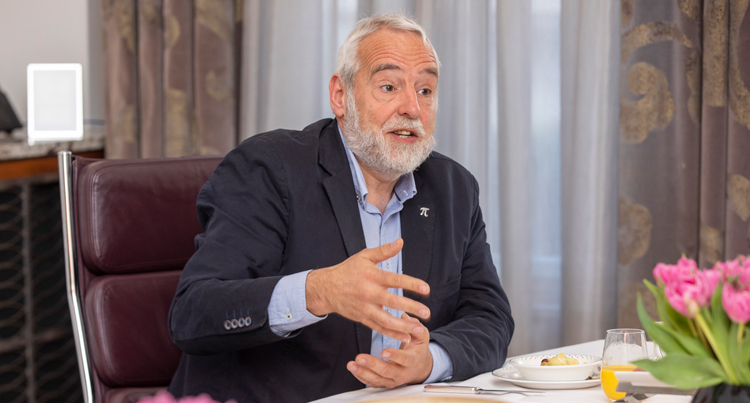
(left to right) Redington managing director of investment consulting Nick Lewis, Pi Partnership Group professional trustee Graham Jung, Russell Investments head of UK fiduciary management Simon Partridge, Capital Cranfield professional trustee Bobby Riddaway, Professional Pensions editor Jonathan Stapleton, Zedra client director Anne Sander and BAA Pension Scheme trustee chair Phil Wilbraham
At the beginning of April, Professional Pensions assembled a panel of experts to discuss some of the challenges larger defined benefit (DB) schemes are currently facing and how they are looking to address them.
The roundtable - chaired by PP editor Jonathan Stapleton and held in association with Russell Investments - looked at how schemes' objectives and investment portfolios have changed over the past six months, both as a result of market volatility and improved funding. It also looked at the investment implications of the new DB funding code and asked ‘where next for DB schemes?'
How have your scheme objectives and investment portfolios changed in the six months since the LDI crisis?
Anne Sander: Our biggest challenge has been the increase in the proportion of illiquid assets. That has proven to be a restriction on what we do and it has slowed down our plans. Our objective has not changed but our timeline to reach that objective has lengthened.
Nick Lewis: Many of our clients are now closer to buyout. Some schemes, trustees, and corporates have thought ‘buyout is just too far away', and pushed off thinking about how they plan to get to that stage. They have now said: ‘Actually, it is half a decade or a decade closer than we thought, so maybe we need to start thinking about it a bit more closely now'.
Phil Wilbraham: It was difficult to make money due to the LDI crisis and because equities and bonds both went against us at the same time. We have had to stretch out our strategy by three further years to get to low dependency. We reworked our strategy late last year, and we are now in the process of reinvesting in more liquid assets than we had before.
Graham Jung: At the start of the year, many trustees of big schemes did not know their exact funding level because there was not enough visibility of both hedge levels and illiquid assets. Now, nearly every scheme can say, ‘We know where we are'. Of course, at the same time, the discussion that is going on is, ‘Where do we want to get to and how do we want to get there?' That is a trustee-sponsor conversation and should take place before any changes are made to LDI arrangements or manager appointments.
Have your views on in-house and outsourcing changed because of this? Have you noticed if there has been a change in views on outsourcing on risk reduction or risk transfer?
Simon Partridge: Many large schemes have in-house teams, which may have functioned well and have done a very good job through that process. However, some may have realised that this team was not big enough or lacked the systems to cope with the demands put on it through that period of volatility. Sponsors and trustees are now considering whether they need to resource up that team, or if there is merit in outsourcing - effectively creating a bigger, more specialised, in-house team but outsourced to someone else.

Nick Lewis: All those looking at outsourcing are in unique positions. For some, it might no longer make sense to do that, because they are so far along their funding journey. For others, it will have highlighted some of the concerns they had about the model they have currently and, therefore, it means they are focusing on it more sharply now. On the other end of the spectrum, some who have already outsourced saw that fiduciary management was not the governance panacea they had hoped for - selecting the right provider is critical.
Anne Sander: For large schemes with an in-house team, they are stable. I am seeing opportunities for some of my smaller clients to look to outsourcing, because they are suddenly in a position where three or four years is the right timeframe. The extra expense of outsourcing relative to their current investment‑consultant-led strategy makes sense because of the potential security and impetus of having an outsourced arrangement to get that final step to a buyout.
Bobby Riddaway: A lot of schemes will struggle with the increased governance burden so you're going to see an increase in the number of professional trustees on schemes and an increase in the number of sole trustees on schemes. The regulator is also looking at potentially mandating that all schemes have a professional trustee. That would lead to 2,500 more schemes needing professional trustees. Also, a recent survey reported that just under half of the current professional trustees are looking to retire in the next few years. The combined effect of all of that is there will not be enough professional trustees, so the industry will need to further expand.
What is your view on illiquids? Do larger schemes need these any more, or are the increased spreads on potentially much simpler credit investments the way to go?
Anne Sander: Illiquidity does not matter if you can get that it right - on timeframe and price. The issue comes when the time horizon changes in terms of whether you're prepared to sell an illiquid asset now because you are overweight from where you want to be. It is a challenging discussion I'm having with corporate sponsors, which say, ‘We cannot possibly take that level of discount right now'. It is that trade-off and, at some point, we'll need to reach a decision on where that trade-off point is.
Bobby Riddaway: The DWP has announced its review of DB pension schemes and so any actions being taken now will be under a further spotlight. That should not drive our actions, but how schemes react over the next 12 months will have an impact on what we end up being regulated on. There is, for example, talk about LDI managers having to do detailed know-your-customer requirements to find out what assets clients hold. This would be a further governance burden.
Graham Jung: In two years' time, we could have a different government. This is the third or fourth time in my career that the government has looked at the pension industry to say, ‘You are too short term', from Myners onwards. Everyone is happy with long-term views, except for politicians, who have a three-year time horizon. The rules will keep changing and that is why we are forced into shorter-term thinking.

Phil Wilbraham: What we try to do at least once a year is to take some time out to make sure our strategic objectives are still what they are or to see whether they have changed. In that debate, you talk about risk appetite and all these sorts of things. Relationships are key. One of the key skills a professional trustee should have is an ability to build relationships. It's not just sharing a coffee but having a constructive relationship so you can have a proper conversation and work out what the issue is.
How do you manage any quasi-liquidity you might have, where something that seems liquid suddenly becomes non-liquid? Have collateral and liquidity waterfalls changed a lot?
Bobby Riddaway: You should understand what you are holding so that you can manage your risks. Risk is not a bad thing, and you should not run on a risk zero basis as that is usually too prudent and expensive. The more you understand the liquidity risk the more you can manage it.
Nick Lewis: There is also the debate around how much headroom to have. The regulator and BoE have said at least 250bps, but some LDI managers now insist on flexibility to cut hedges once below 200bps. We saw in the crisis that you can burn through 50bps of collateral in a single day, so although 250bps seems like a huge amount of headroom, you are potentially one day away from your manager being able to make cuts. You need extra prudence on top of that.
Simon Partridge: This is why risk management and reporting is so critical, so that you know what you are holding, what risks you're exposed to and what can be sold at short notice.
What are everyone's concluding thoughts?
Graham Jung: It is critical for trustees and sponsors to take these decisions in the cold, clear light of day. Do not fall into the trap of fixing the bottom-up details of LDI portfolios and manager appointments before you're clear on how your top-down strategy has changed.
Bobby Riddaway: Governance and risk management is going to go up a level. Schemes will need to review their risk reports and pay attention to these liquidity risks taking into account the events of last year. This is now as important as the other main risk of your administrator paying pensions, and monitoring the covenant of your sponsor.
Nick Lewis: It's much easier to make difficult decisions if you have clear objectives that all stakeholders have bought into. Review them regularly and ensure they're up to date. When they are the guiding star of your complex decisions, it is much easier to make those quickly.
Anne Sander: Make sure you have the right reporting and transparency to monitor against those objectives and risks that. Whether that is on the investment side or the admin side, it's about thinking like a risk manager more than the traditional view of a trustee, which is simply being there to make things tick over.
Phil Wilbraham: People are doing things part-time or working for several clients, and it is important those trusted relationships are constructed. The supplier - the consultant or the manager - must be able to challenge the trustee as well, so the relationship is strong and professional in that respect.
Simon Partridge: The point was made earlier about how schemes may consider outsourcing for just for a few years while they get ready for buyout or to help position portfolios for a longer-term low-dependency objective. Whatever approach is taken, it's vital that trustees know what is in their portfolios through regular reporting and clear risk management. More detail within portfolios is critical for understanding where you are and helps to define where you want to get to and by when.
This roundtable was held on 25 April 2023 in association with Russell Investments







